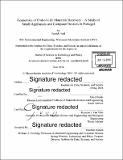| dc.contributor.advisor | Elsa Olivetti and Krystyn J. Van Vliet. | en_US |
| dc.contributor.author | Ford, Patrick (Patrick Benjamin) | en_US |
| dc.contributor.other | Technology and Policy Program. | en_US |
| dc.coverage.spatial | e-po--- | en_US |
| dc.date.accessioned | 2016-10-14T15:54:45Z | |
| dc.date.available | 2016-10-14T15:54:45Z | |
| dc.date.copyright | 2016 | en_US |
| dc.date.issued | 2016 | en_US |
| dc.identifier.uri | http://hdl.handle.net/1721.1/104831 | |
| dc.description | Thesis: S.M. in Technology and Policy, Massachusetts Institute of Technology, School of Engineering, Institute for Data, Systems, and Society, Technology and Policy Program, 2016. | en_US |
| dc.description | Cataloged from PDF version of thesis. | en_US |
| dc.description | Includes bibliographical references (pages 119-126). | en_US |
| dc.description.abstract | The challenges brought on by the increasing complexity of electronic products, and the criticality of the materials these devices contain, present an opportunity for maximizing the economic and societal benefits derived from recovery and recycling. Small appliances and computer devices (SACD), including mobile phones, contain significant amounts of precious metals including gold and platinum, the present value of which should serve as a key economic driver for many recycling decisions. However, a detailed analysis is required to estimate the economic value that is unrealized by incomplete recovery of these and other materials, and to ascertain how such value could be reinvested to improve recovery processes. I present a dynamic product flow analysis (dPFA) for SACD throughout Portugal, a European Union member, including annual data detailing product sales and industrial-scale preprocessing data for recovery of specific materials from devices. I employ preprocessing facility and metals pricing data to identify losses, and develop an economic framework around the value of recycling including uncertainty. I show that significant economic losses occur during preprocessing (over $70M USD unrecovered in computers and mobile phones, 2006-2014) due to operations that fail to target high value materials, and characterize preprocessing operations according to material recovery and total costs. Finally, I present market level, operational, and policy recommendations aimed at capturing the unrecovered economic value identified in the Portuguese WEEE recycling system. | en_US |
| dc.description.statementofresponsibility | by Patrick Ford. | en_US |
| dc.format.extent | 126 pages | en_US |
| dc.language.iso | eng | en_US |
| dc.publisher | Massachusetts Institute of Technology | en_US |
| dc.rights | M.I.T. theses are protected by copyright. They may be viewed from this source for any purpose, but reproduction or distribution in any format is prohibited without written permission. See provided URL for inquiries about permission. | en_US |
| dc.rights.uri | http://dspace.mit.edu/handle/1721.1/7582 | en_US |
| dc.subject | Institute for Data, Systems, and Society. | en_US |
| dc.subject | Engineering Systems Division. | en_US |
| dc.subject | Technology and Policy Program. | en_US |
| dc.title | Economics of end-of-life materials recover : a study of small appliances and computer devices in Portugal | en_US |
| dc.title.alternative | Study of SACD in Portugal | en_US |
| dc.type | Thesis | en_US |
| dc.description.degree | S.M. in Technology and Policy | en_US |
| dc.contributor.department | Massachusetts Institute of Technology. Engineering Systems Division | |
| dc.contributor.department | Massachusetts Institute of Technology. Institute for Data, Systems, and Society | |
| dc.contributor.department | Technology and Policy Program | |
| dc.identifier.oclc | 959240151 | en_US |
